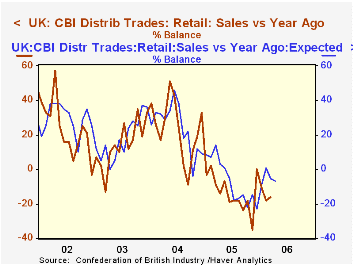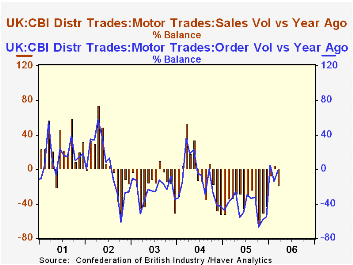 Global| Mar 29 2006
Global| Mar 29 2006Mortgage Applications Recover Some
by:Tom Moeller
|in:Economy in Brief
Summary
Last week, the total number of mortgage applications recovered 1.2% following two weeks of decline. Nevertheless, applications in March are 2.4% below the February average which fell 6.3% m/m. Purchase applications recovered all of [...]

Last week, the total number of mortgage applications recovered 1.2% following two weeks of decline. Nevertheless, applications in March are 2.4% below the February average which fell 6.3% m/m.
Purchase applications recovered all of the prior week's decline with a 2.7% rise but the average level during March remained down 1.6% from the February average.
During the last ten years there has been a 54% correlation between the y/y change in purchase applications and the change in new plus existing single family home sales.
Applications to refinance fell for the third straight week, off 1.0% w/w and the March level is 3.1% below the February average which fell 2.0% from January.
The effective interest rate on a conventional 30-year mortgage rose two basis points to 6.56% and the rate on 15-year financing ticked up to 6.28%. Interest rates on 15 and 30 year mortgages are closely correlated (>90%) with the rate on 10 year Treasury securities and during the last ten years there has been a (negative) 82% correlation between purchase applications and the effective rate on a 30-Year mortgage.
The Mortgage Bankers Association surveys between 20 to 35 of the top lenders in the U.S. housing industry to derive its refinance, purchase and market indexes. The weekly survey accounts for more than 40% of all applications processed each week by mortgage lenders. Visit the Mortgage Bankers Association site here.
Money and Modern Banking without Bank Runs from the Federal Reserve Bank of New York is available here.
| MBA Mortgage Applications (3/16/90=100) | 03/24/06 | 03/17/06 | Y/Y | 2005 | 2004 | 2003 |
|---|---|---|---|---|---|---|
| Total Market Index | 571.7 | 565.0 | -15.2% | 708.6 | 735.1 | 1,067.9 |
| Purchase | 404.1 | 393.6 | -14.2% | 470.9 | 454.5 | 395.1 |
| Refinancing | 1,558.4 | 1,574.5 | -16.1% | 2,092.3 | 2,366.8 | 4,981.8 |
by Carol Stone March 29, 2006

British retailers face disappointing sales this month, according to today's release of the monthly CBI (Confederation of British Industry) Distributive Trades Survey. A month ago, a net of just 5% of respondents said they looked for March sales to weaken from a year earlier. Instead, a net of 16% saw sales fall. This was a second consecutive actual result that came in far below survey participants' expectations. In February, a slim majority of 1% expected sales to rise, but the actual balance was significantly different, at -18%.
In the motor trades, March results were also far below survey participants' plans. After a difficult year in 2005, many dealers expected sales to recover, so that in January, only a net balance of 7% expected further declines in sales. But sales came in lower, on balance, at 34%. Some recovery did take place in February, when a net of 5% of dealers saw rising sales, albeit over a weak year-ago base. However, this improvement did not last. Dealers looked for continuing modest gains in March to a +7% reading, but sales fell on balance at 18% of outlets.
Retailers have cut orders from their suppliers; after a brief period of less negative readings, a full 25% of firms, on net, reduced order volume in March, following -12% in January and -17% in February. In the motor trades, the number of firms raising or reducing orders is just about even, but this follows a decline at 44% of firms overall for last year, with weakness as deep as -67% in October.
We have cited here the weakening labor markets in the UK, most recently on March 15. Apparently, while disappointing, it should be no wonder that retail sales are feeling the effects.
| United Kingdom | Apr 2006 | Mar 2006 | Feb 2006 | Jan 2006 | 2005 | 2004 | 2003 |
|---|---|---|---|---|---|---|---|
| Retail Sales: Expected | -7 | -5 | +1 | -9 | -7 | +25 | +18 |
| Reported | -- | -16 | -18 | -11 | -14 | +24 | +14 |
| Motor Trades: Expected | -30 | +7 | +10 | -34 | -36 | -8 | -18 |
| Reported | -- | -18 | +5 | -7 | -39 | -8 | -19 |
Tom Moeller
AuthorMore in Author Profile »Prior to joining Haver Analytics in 2000, Mr. Moeller worked as the Economist at Chancellor Capital Management from 1985 to 1999. There, he developed comprehensive economic forecasts and interpreted economic data for equity and fixed income portfolio managers. Also at Chancellor, Mr. Moeller worked as an equity analyst and was responsible for researching and rating companies in the economically sensitive automobile and housing industries for investment in Chancellor’s equity portfolio. Prior to joining Chancellor, Mr. Moeller was an Economist at Citibank from 1979 to 1984. He also analyzed pricing behavior in the metals industry for the Council on Wage and Price Stability in Washington, D.C. In 1999, Mr. Moeller received the award for most accurate forecast from the Forecasters' Club of New York. From 1990 to 1992 he was President of the New York Association for Business Economists. Mr. Moeller earned an M.B.A. in Finance from Fordham University, where he graduated in 1987. He holds a Bachelor of Arts in Economics from George Washington University.
More Economy in Brief
 Global| Feb 05 2026
Global| Feb 05 2026Charts of the Week: Balanced Policy, Resilient Data and AI Narratives
by:Andrew Cates






